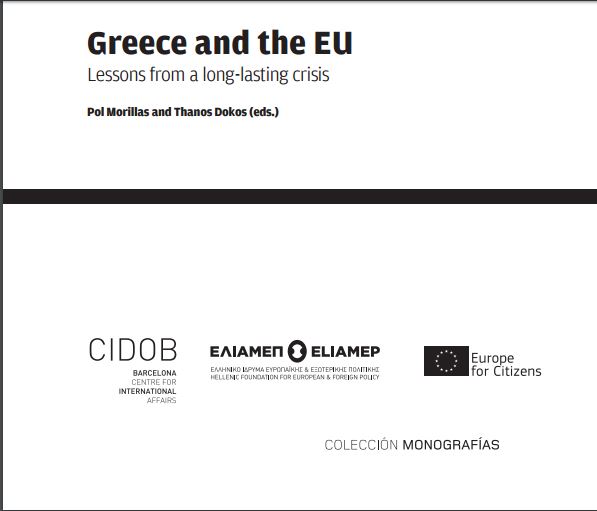Τσούκαλης, Λουκάς, (2016), “Ποιό είναι το χειρότερο; “, Η Καθημερινή, 5 Ιουνίου Σκέφτομαι μερικές φορές ποιο ήταν το χειρότερο από όλα τα δεινά που έπληξαν τη χώρα τα τελευταία χρόνια: ένας καταιγισμός αρνητικών εξελίξεων που μας σπρώχνει ολοένα και περισσότερο προς τα κάτω, ένας συνεχής φαύλος κύκλος. Είναι, άραγε, η μεγάλη υποβάθμιση του βιοτικού μας επιπέδου το χειρότερο που μας συνέβη; Σε σταθερές τιμές, το εθνικό προϊόν έχει ήδη πάει πίσω …Read More
Greece and the EU. Lessons from a Long-lasting Crisis
Pol Morillas, Thanos Dokos, (2016), “Greece and the EU. Lessons from a Long-lasting Crisis”, CIDOB Monographs, Μάϊος Less than a year ago, the Greek crisis reached its highest level of tension. After arduous negotiations, the Greek government and its creditors signed the agreement for a third bailout in July 2015,which should provide liquidity to the Greek public sector in return for a severe programme of deficit adjustment and structural reforms. At …Read More
What’s Next for Greece?
Park, Jeanne, (2015), “What’s Next for Greece?”, Interview of Eleni Panagiotarea in Council on Foreign Relations, 23 Σεπτεμβρίου With the Syriza party’s decisive victory in Greece’s snap elections on Sunday, Alexis Tsipras won his second term as prime minister less than a year after he first took office. Eleni Panagiotarea, research fellow at the Athens-based ELIAMEP think tank, says that while these results may restore a measure of political stability, …Read More
Greek Elections 2015: Quo Vadis, Alexis?
Panagiotarea, Eleni, (2015), “Greek Elections 2015: Quo Vadis, Alexis?”, Heinrich Boll Stiftung publications, 23 Σεπτεμβρίου There is no doubt about it: Tsipras proved a real master of the political game. His gamble paid off. In fact, whether by accident or by design, he won more than he staked: a clear victory, following Syriza’s spectacular policy U-turn on ending austerity; a clear mandate to proceed with the implementation of the third …Read More
Why Greeks voted the way they did in the bailout referendum
Jurado, Ignacio, Konstantinidis, Nikitas, Walter, Stefanie, (2015), “Why Greeks voted the way they did in the bailout referendum”, LSE blog, 20 Ιουλίου The recent ‘Greferendum’ on a draft bailout proposal submitted by the European Commission highlights the confounding effects of economic and political interdependence on democratic politics. Whereas the British electorate will be given up to two years in order to deliberate and decide over British membershipin the EU (having already opted out …Read More
A Perilous ‘No’ to the Status Quo
Hatzis, Aristides, (2015), “A Perilous ‘No’ to the Status Quo”, Wall Street Journal, 8 Ιουλίου People outside Greece can’t comprehend the extent of the “no” side’s victory in Sunday’s referendum. It wasn’t only a landslide, 61% to 39%. Σχετικές Αναρτήσεις Gros, Daniel, (2015), “Europe’s Greek Failure”, Project Syndicate, 9 Ιουλίου Friedman, George, (2015), “The Greek Vote and the EU Miscalculation“, Stratfor Geopolitical Weekly, 7 Ιουλίου
Μένουμε Ευρώπη
Τσούκαλης, Λουκάς, (2015), “Μένουμε Ευρώπη”, Καθημερινή, 30 Ιουνίου Στις πολύ δύσκολες μέρες που ζούμε, μέρες στις οποίες πιθανότατα θα κριθεί το μέλλον της χώρας μας για μερικές δεκαετίες, ας προσπαθήσουμε να δούμε με κάποια νηφαλιότητα βασικά δεδομένα που προέκυψαν τους τελευταίους μήνες. Αφού κέρδισε τις εκλογές με υποσχέσεις που δεν είχαν καμιά απολύτως ελπίδα να υλοποιηθούν (θα μου πείτε και άλλοι το είχαν κάνει πριν και δεν θάχατε άδικο), η νέα …Read More
A ‘take-it-or-leave it’ vote is a recipe for disaster for Greece
Hatzis, Aristides, (2015), “A ‘take-it-or-leave it’ vote is a recipe for disaster for Greece”, Financial Times, 28 Ιουνίου Early Sunday morning the Greek parliament voted to hold a referendum that will be decisive for the country’s future. Supposedly this is going to be a vote on a “take-it-or-leave-it” proposal by Greece’s creditors — the EU, the European Central Bank and the International Monetary Fund.But in fact this is going to …Read More
Οχι άλλο «μοντέλο ανάπτυξης»
Παναγιωταρέα, Ελένη, (2015), “Οχι άλλο «μοντέλο ανάπτυξης»”, Κυριακάτικη Καθημερινή, 6 Ιουνίου Κάθε νέο συνέδριο που λαμβάνει χώρα για το «νέο μοντέλο ανάπτυξης» που χρειάζεται η Ελλάδα, κάθε νέα μελέτη που δημοσιεύεται για την «επανεκκίνηση της οικονομίας» προκαλεί θλίψη αν όχι απελπισία, εκ νέου. Παρά τις καλές προθέσεις και την εγνωσμένη ανάγκη ανασύνταξης, κανείς δεν μοιάζει να ξεκινά με τη βασική ερώτηση: ποιος πρόκειται να υλοποιήσει το «μοντέλο» αυτό; Υπάρχουν στη …Read More
Υπάρχει και τρίτο σενάριο
Σωτηρόπουλος Α. Δημήτρης, (2015), “Υπάρχει και τρίτο σενάριο”, Το Βήμα, 24 Μαΐου. H εγχώρια συζήτηση για το αν θα φθάσουμε ή όχι σε συμφωνία με τους δανειστές γίνεται ως εάν υπάρχουν μόνο δύο εναλλακτικά σενάρια. Το πρώτο σενάριο είναι να υποχωρήσει η κυβέρνηση και το δεύτερο είναι να μην υποχωρήσει, αλλά να προτιμήσει τη ρήξη. Ο παραδοσιακός ελληνοκεντρισμός που διέπει τις συζητήσεις για τη θέση της Ελλάδας στην Ευρώπη και στον …Read More





